
Dental Implants – Jacksonville, FL
The Gold Standard of Tooth Replacement
 While there are several options available today for rebuilding a
patient’s smile, none are as lifelike or as long-lasting as dental implants. Why are they so successful?
It’s simple – dental implants replace the ENTIRE natural tooth, not just the visible, white portion
that’s known as the crown. With a new tooth root in place, the patient’s jawbone is able to remain full
and healthy, and oral function is greatly improved as well. Better yet, our
dentists at Jacksonville Complete Dentistry offer the entire procedure right here in-office for maximum
convenience and comfort! If you’d like to find out whether or not you’re the right candidate for dental
implants in Jacksonville, just give us a call today!
While there are several options available today for rebuilding a
patient’s smile, none are as lifelike or as long-lasting as dental implants. Why are they so successful?
It’s simple – dental implants replace the ENTIRE natural tooth, not just the visible, white portion
that’s known as the crown. With a new tooth root in place, the patient’s jawbone is able to remain full
and healthy, and oral function is greatly improved as well. Better yet, our
dentists at Jacksonville Complete Dentistry offer the entire procedure right here in-office for maximum
convenience and comfort! If you’d like to find out whether or not you’re the right candidate for dental
implants in Jacksonville, just give us a call today!
Why Choose Jacksonville Complete Dentistry for Dental Implants?
- All-Inclusive Dental Implant Care Provided In-House
- Fair Prices with Convenient Payment Options
- State-of-the-Art Dental Technology for Safe, Precise Treatment
What Are Dental Implants?

There are three parts to a dental implant: the implant itself, the abutment, and the crown. The implant is a titanium post that serves as a replacement for the tooth’s root. The abutment is a metal fixture that is inserted into the implant after healing and serves to connect the implant to the crown. The crown, made from lifelike materials like porcelain, is the visible portion of the tooth.
No other method of tooth replacement recreates the entire structure of lost teeth; traditional dentures and dental bridges only replace the crown portions above the gumline. Because dental implants are anchored within the jawbone, they provide unparalleled stability, reliability, and longevity – they can last for decades if you take good care of them! They’re considered the gold standard of tooth replacement, which is why our dentists will almost always recommend dental implants for patients who wish to rebuild their smiles after tooth loss.
The 4 Step Dental Implant Process

Most other dental offices have to refer their patients to an outside specialist to have their implants placed, and this tends to add time, expense, and stress to the process of rebuilding the smile. At Jacksonville Complete Dentistry, however, our team has the training to complete the entire procedure under one roof. This makes getting dental implants much more efficient from beginning to end, plus patients can have peace of mind knowing they’ll be able to work with the same dentist and team that they trust the entire time.
Initial Dental Implant Consultation

During your dental implant consultation, you and Dr. Johnson or Dr. Barker will discuss your eligibility for treatment. Considering your oral health, overall health, and jawbone density, you may be required to undergo preliminary treatments before moving forward with dental implant surgery. These can include bone grafting, a sinus lift, periodontal therapy, or even tooth extraction. You will receive a personalized treatment plan that explains the entire process as well as how much you can expect your new smile to cost.
Dental Implant Surgery

On the day of your dental implant surgery, you will receive local anesthesia to ensure your mouth is numb and you feel no pain. Your implant dentist in Jacksonville will then make one or more incisions in your gums before exposing the bone. Each dental implant will be placed and properly positioned to ensure maximum support. We will then close the gum tissue and place a protective healing cap over the top of each surgical site.
Dental Implant Osseointegration/Abutment

Once your procedure is complete, you will return home to spend the next 3-6 months recovering. During this time, osseointegration will occur, which involves the fusing of the bone and the implant. While at home, you will be expected to follow various guidelines to ensure you properly heal and experience no complications. Our team will evaluate your progress and eventually place metal abutments on top of each implant post. These appliances make it possible for your customized restoration to connect to your dental implants in Jacksonville.
Delivery of Dental Implant Restorations

The last step of the dental implant process is to have your dental crown, bridge, or denture secured into place. Made from high-quality materials, your new restoration will blend in seamlessly with the rest of your teeth and give you your first look at a fully restored smile. It is at this stage you can begin to enjoy the complete benefits of your dental implants. Speaking, eating, and smiling will become easier and more enjoyable once the entire process is complete.
Benefits of Dental Implants

When choosing dental implants to replace your missing teeth, our team will not only go over the process of receiving these prosthetics, but we’ll thoroughly explain why they are considered the “gold standard” for tooth replacement. Because of their superiority in comparison to dental bridges and dentures, the benefits of dental implants in Jacksonville cannot be overlooked. From their high success rate of placement and longevity to their ability to strengthen your bite force and provide stimulation to your jawbone, they can accomplish what no other restorative solution can, which is why millions of Americans are embracing life with dental implants.
Day-to-Day Benefits

- Stability: Traditional tooth replacements just sit on top of the gums or lean on the surrounding teeth for support, but implants are anchored within the jawbone. This makes them extremely strong, so patients don’t have to worry about their new teeth shifting or breaking no matter what they are eating.
- Aesthetics: Implants are usually topped with white porcelain restorations and have no obvious metal attachments or clasps, helping them blend seamlessly into any smile.
- Easy to Clean: Bad bacteria can grow underneath dental bridges and dentures, but with dental implants in Jacksonville, you can more easily maintain your new teeth because they act just like regular ones!
- Improved Quality of Life: Unlike denture-wearers who are often embarrassed by their prosthetics and shy away from social gatherings, you can embrace the freedom to smile, eat, and speak when surrounded by others. These permanent prosthetics will help you to embrace a better quality of life.
Health Benefits
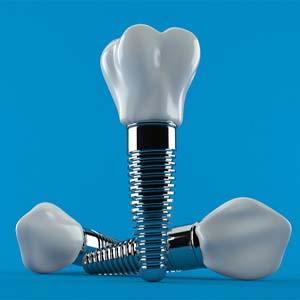
- Keep More Natural Tooth Structure: Dental implants don’t need to be anchored to any existing teeth like dental bridges or partial dentures. Instead, they are anchored to your jawbone. This allows you to keep healthy teeth fully intact instead of altering their structure.
- Bone Retention: The jawbone naturally starts to shrink and change shape after a tooth has been lost, and implants are the only treatment that can stop and even reverse this process. As a result, they not only help maintain the strength of the bite but the overall shape of the face, too.
- No Dental Drift: Tooth loss often causes healthy teeth to shift out of alignment in an attempt to cover the vacated socket. With dental implants, your natural teeth will stay in place, preventing you from additional tooth loss and/or orthodontic treatment in the future.
- Better Overall Health: When losing one or more teeth, you become susceptible to various health problems, such as osteoporosis, diabetes, and even heart disease. By choosing to replace your teeth with dental implants, you can minimize your risk and take better care of your oral and overall health.
Long-Term Benefits

- Successful Implant Placement: As long as you have a trustworthy and skilled implant dentist in Jacksonville administering your dental implant surgery, you can expect the success rate to be around 95%. After 10 years, if you commit to taking care of your new smile, the rate will remain between 90 and 95%!
- Durability: With consistent oral hygiene and routine dental visits, a dental implant can easily be expected to last for 30 years or more.
- Money Savings: Dentures and dental bridges may be less expensive upfront, but they require more frequent upkeep and product purchasing over the years. Dental implants don’t require denture adhesives, cleaning products, or regular adjustments and replacements, making them much more cost-effective in the long run.
Who Dental Implants Can Help

Most patients that have lost a tooth or teeth are ideal candidates for dental implants. The ability to replace a missing tooth with implants depends on a patient’s medical condition, the quantity of bone, the location and quality of remaining teeth, and a few other factors. We are happy to go over your replacement options, discuss their benefits and drawbacks, and answer any questions you may have at a FREE implant consultation.
There are several options available for restoring dental implants, and your implant dentist’s recommendation will depend on the number of teeth that need to be replaced and the patient’s own personal preferences. They include:
Missing One Tooth
If you’ve only lost a single tooth and have an individual implant in need of restoration, a dental crown can do the job without negatively affecting the surrounding natural teeth. Your new crown will be crafted from tooth-colored materials for a beautiful, lasting appearance.
Missing Multiple Teeth
While a traditional bridge is fixed into a gap by placing crowns over adjacent natural teeth, an implant-retained bridge is adhered with – you guessed it – dental implants! Two dental implants are used to anchor each side of the dental bridge, and a patient’s ongoing oral health is improved as a result.
Missing All Teeth
An implant denture is ideal for patients who need to restore multiple teeth in the same area. The denture can attach to several implants at once, providing the same, reliable quality at a more cost-effective rate when compared to covering each implant with an individual restoration. Depending on the patient’s needs, this prosthetic can be truly fixed, or it can remain removable in nature.
Understanding the Cost of Dental Implants

Because dental implants are able to help patients with varying degrees of tooth loss, the final cost of the procedure can be quite different from patient to patient. Individual factors such as how many teeth a patient would like to be replaced, where they are located in the mouth, and what kind of restoration is used can all make the procedure more or less expensive.
While it’s true that implant restorations tend to cost more than other traditional options, they are actually the best financial choice long-term. In addition to their superior function and aesthetics, implants also last much, much longer than other restorations. Regular bridges and dentures typically need to be replaced every 7-10 years, while implants have been shown to last for 30 years or more. A patient won’t have to get the periodic maintenance necessary with other restorations, saving them a lot of time and money over the years.
Types of Dental Implants

Whether you have a single, multiple, or an entire arch of missing teeth, dental implants are a versatile solution used by dental professionals to restore smiles. Although costlier than fixed bridges or dentures, these unique prosthetics vary in cost depending on how many you need to replace your missing teeth. The least expensive option is a single tooth dental implant, as it only contains one post, metal abutment, and dental crown. The price increases as you move to an implant bridge, which requires at least two dental implants. The most expensive option is the implant denture, which requires four to six dental implants to be surgically placed into your jawbone before a fabricated denture is secured to the top.
What Are the Stages of Dental Implant Treatment?

You might assume that you will be expected to pay the entire amount upfront. Fortunately, this is not true. Each stage of treatment incurs a separate fee, allowing you to better budget along the way. From the initial consultation with a dentist in Jacksonville to the surgical placement of your implants to receiving and securing your final restoration, each step will allow you to pay as you go, making it far more manageable than coming up with one lump sum.
Are Dental Implants Worth the Investment?

Initially, you can expect the cost to be significantly higher, which can be a deterrent for some individuals, but if you consider the continued maintenance required with dentures and fixed bridges, you can see that implants are worth the investment. Not only are they far more durable, but they are designed to last decades. If you take care of them as you should, you may never need to have your implants replaced. Yes, your restoration (i.e., dental crown, bridge, denture) will need to be replaced in time, but by taking proper steps to maintain your new smile, you can enjoy a smile that lasts longer and improves your quality of life by preserving your jawbone and preventing many of the most common problems that can occur because of missing teeth (i.e., gum disease, facial collapse, additional bone and tooth loss).
Does My Dental Insurance Cover Dental Implants?

When it comes to dental implant cost, the harsh reality is that most insurance companies do not offer coverage. While this is slowly changing among some insurers, many still believe these restorations to be a “want” and not a “need.” However, you may find that your insurance company will agree to pay for portions of your procedure, such as the consultation, restoration, or even any pre-implant dental work you might need (i.e., periodontal therapy, tooth extraction, bone graft).
You might also consider applying for flexible financing through CareCredit, which is a third-party financier that offers low-interest payment plans that can be stretched out over several months.
Dental Implant Failure & Salvage

Dental implants have an incredible success rate of 95% even 10 years after their placement. While this means the vast majority of patients can expect to count on their dental implants lasting for a lifetime, there is still a remote chance of dental implant failure. It’s important to know the warning signs of a failing dental implant and what you should do to save your smile! Read on as we go over the basics of dental implant failure and how we may be able to treat it.
Advanced Dental Implant Procedures

There are certain treatments that may or may not need to be part of the dental implant process depending on your needs. Our team can explain these services and why they’re necessary during your initial consultation, so you’ll know what to expect right from the beginning. At Jacksonville Complete Dentistry, many of the advanced procedures associated with dental implant placement can be handled by an in-office specialist; below are a few examples of such treatments.
Bone Grafting
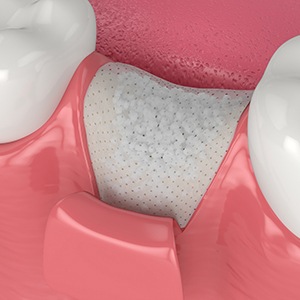
Have your teeth been missing for a while? If so, bone grafting may be needed to ensure that the bone in the jaw is dense enough for dental implant posts. The grafting process involves transplanting bone tissue from somewhere else in your body to the areas of the jaw that need to be repaired. Thanks to the new tissue, more bone cells will start to form. After about 3 to 9 months, your mouth will have completely healed, and you’ll be able to have dental implants placed once we confirm that there’s an acceptable level of bone density in your jaw.
Sinus Lift
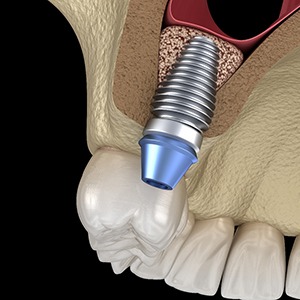
The back of your upper jaw often has relatively low bone density, and the sinus cavity is sometimes very close to where implants would need to be inserted in order to replace your molars. As such, a sinus lift may be needed in specific cases. As the name of the procedure suggests, the sinus cavity will be raised. This creates space where grafting material can be placed. The result is a thicker jawbone and sinuses that are safely out of the way of any dental implants that will be placed in the near future.
Note that recovery could be anywhere between 4 to 12 months. It’s difficult to give an exact number because different mouths heal at different rates.
PRP/PRF Treatment
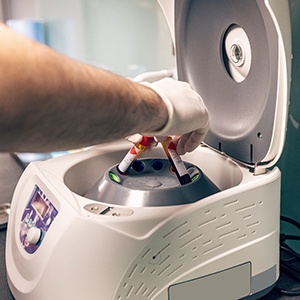
If your body isn’t able to heal successfully after dental implant surgery, the implant posts will fail. As such, we may perform a PRF (platelet-rich fibrin) or PRP (platelet-rich plasma) treatment to aid with your recovery. By processing a sample of your blood with a centrifuge, we can draw out growth factors that help with healing. When PRF or PRP is applied to the implant site, it can significantly speed up recovery and reduce your risk of post-surgical infection.
Ridge Expansion
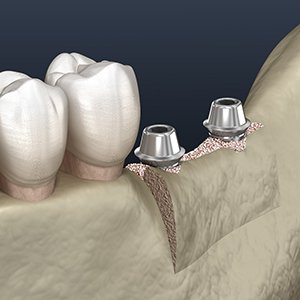
When we’re examining your jawbone, we might find that it’s too thin for dental implants to be placed. To address this issue, we’ll need to perform a ridge expansion. The bone will be carefully divided into inner and outer segments. This creates a small space that can be filled with grafting material. It may take around 6 months for your mouth to heal after ridge expansion, but once it does, the jaw should be wide enough for the dental implant procedure.
Maintaining & Caring for Your Dental Implants

One of the best things about dental implants is their potential to last for decades. In fact, they could provide you with a lifetime of sturdy function and pleasing aesthetics — but only if you care for them properly. Below, you’ll find basic instructions on how to maintain your gorgeous new teeth so you can prevent infections and trauma that might otherwise rob you of your healthy, restored smile.
Make Oral Hygiene a Priority

Without proper oral hygiene, bacteria could sneak into the area around your implants and damage the tissue that supports them, leading to painful complications. Here are some tips to help you maintain a clean mouth that has a minimal risk of infection:
- Brush your teeth twice a day – Be sure to always brush along the gumline and on the backs of your teeth (both your natural teeth and your implant-supported ones).
- Floss thoroughly – If you have an implant-supported bridge, you may need to use a floss threader or water flosser to clean the area between your restoration and your gums.
- Use an antibacterial mouth rinse – Your knowledgeable implant dentist might recommend a certain product to help you keep harmful bacteria away.
- Stay hydrated – If you are well-hydrated, you are more likely to produce enough saliva to rinse away bacteria that might otherwise cling to your teeth and affect your implants.
Protect Your Dental Implants from Physical Trauma

Physical trauma to your mouth could damage the tissue around your implants; it might even loosen the implants themselves or damage the artificial teeth on top of them. To prevent such incidences from happening, you should:
- Wear a nightguard if you struggle with bruxism (teeth grinding) – The constant pressure of teeth grinding can damage your restorations and place extra stress on your implants, increasing the chance that your new teeth will need repairs.
- Wear a sports guard – Even if your sport of choice is not a “contact sport,” you should still wear a custom mouth guard to shield your teeth, gums, and jaw from trauma.
- Be mindful of your surroundings – A slip and fall could have devastating consequences for your oral health. Being aware of your surroundings and walking carefully can go a long way toward keeping your new teeth intact.
Visit Your Dentist Regularly

Whether you have replaced one or all of your teeth with dental implants, regular visits to your dentist are still important. Not only will your remaining natural teeth be cleaned and inspected, but your dentist will also evaluate your dental implants. If they notice any signs of infection or damage, they may be able to address such issues before they become serious. Depending on the nature of your restoration, our team may even temporarily detach it from your implants so we can clean your mouth as thoroughly as possible.
At Jacksonville Complete Dentistry, our team are true dental implant experts. If it is time for your next checkup, or you have questions about how to care for your restored teeth, reach out to our team today.
Dental Implant Post-Op Instructions

Knowing how to properly care for your new smile is important if you want to make sure that your teeth last as long as possible. This is why you can count on our team at Jacksonville Complete Dentistry to provide dental implant post-op instructions after your procedure is complete. These helpful tips and suggestions will put you on a path to recovery and enjoying life with your new, functional, and beautiful smile.
Dental Implant FAQs

Whether you are preparing for your consultation for dental implants or you are considering them as a possible option to replace your missing teeth, Jacksonville Complete Dentistry wants you to have as much information as possible to make a confident decision. This is why our team has created dental implant FAQs in Jacksonville for you to review. Should you have any additional questions or concerns, please call our office.
Does Insurance Cover Dental Implants?
To answer this question, you’ll need to review your individual dental insurance policy. The reason for this is because it is dependent on the company and coverage as to whether dental implant placement is covered. Typically, this type of restorative treatment is not covered, but there may be aspects of your procedure that can qualify, including:
- Anesthesia/sedation
- Customized restoration (i.e., dental crown, bridge, or denture)
- Initial consultation
- Pre-implant dental work (i.e., gum disease therapy, bone graft, sinus lift)
If the hassle of working with the insurance company sounds unappealing, talk to a member of our team who will be happy to assist in working on your behalf with your insurance company, filing any necessary claims and helping you get the most out of your benefits.
Are Dental Implants Safe?
Considered to be one of the safest, most effective methods of tooth restoration, dental implants are becoming a much more popular treatment solution. In fact, you’ll be pleased to know that dental implant placement has an extremely high success rate of around 95%. However, every procedure does come with risks, which we will explain during your initial consultation.
Do Dental Implants Ever Fail?
When it comes to risks with dental implant surgery, it is usually because of possible implant failure. As rare as it is, an implant can fail under certain circumstances, some of which include:
- Improper placement – If the professional you are seeing does not carefully or properly place the implant in the correct spot, added pressure can be put on it and ultimately result in failure.
- Smoking or Using Tobacco – Not only is this harmful to your overall health, but smoking weakens your immune system and makes it more difficult for you to heal during the osseointegration process.
- Weakened Immune System – Just like smoking, certain diseases or conditions such as diabetes or an autoimmune disorder can compromise your immune system and make it harder to fight off infection and heal.
At Jacksonville Complete Dentistry, our team has the training and expertise to complete the entire process under one roof. You can feel confident in your decision to pursue implant placement with our talented professionals.
If I Have Dentures, Can I Switch to Dental Implants?
Yes! After a complete examination by our dentists, we will evaluate your teeth, gums, and jawbone density to ensure you are a qualified candidate for dental implants. Your bone must be strong enough to support an implant and its custom restoration, so if it isn’t, it will be necessary for you to either continue treatment with traditional dentures or undergo a bone graft (or sinus lift) to add more support to your jawbone.
Many patients have found great success by making the switch from dentures to dental implants.
Am I Too Old to Get Dental Implants?
There is technically no upper age limit to receive dental implants. Once you are an adult, there are other factors that need to be taken into account outside of age. For example, if you have any existing health issues that could negatively affect your ability to receive dental implants, you may not be eligible. For example, if you have a condition that affects your body’s ability to heal (ex. autoimmune disease, osteoporosis, etc.), you may want to consider alternative tooth replacement solutions.
Will I Have to Take Off Work for Dental Implant Surgery?
In most cases, you will only need between one and two days to recover after getting dental implants. However, every case is unique, which means we may recommend more days to recover depending on how many implants you had placed. Additionally, if you have a job that requires a certain amount of physical labor to perform, you may want to either take time off from work or schedule your surgery to happen just before a weekend.




